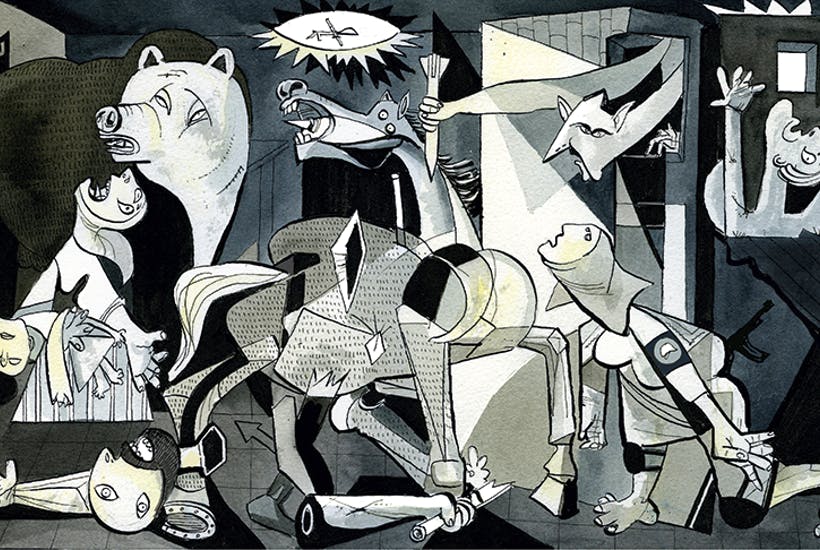A decade after the Arab Spring, good news anywhere is hard to find. In contrast to Asia, Latin America and sub-Saharan Africa, extreme poverty has increased in the Arab region. Both internal economic growth and direct foreign investment have declined. Unemployment, especially among the young, has grown. Education standards are falling. There is less press freedom, less freedom of association. A BBC survey last year found that more than half of Arabs want to emigrate. In the countries where autocratic leaders were overthrown — Tunisia, Libya, Egypt and Yemen — there is nostalgia for the pre-revolutionary era.
This week in Egypt, now the most brutally repressive Arab country since Saddam Hussein’s Iraq, any public mention of the anniversary of the 2011 Tahrir uprising is discouraged. Wael Ghonim, the Egyptian former Google executive whose Facebook page exposing police torture instigated the revolution, now lives in self-imposed exile in California. But in recent social media videos he resembles not so much a high-flying tech geek as the tens of thousands of political prisoners — from Islamists to liberals — languishing in Egypt’s filthy prisons. His head and eyebrows are crudely shaven, he looks painfully gaunt and his remarks are uncharacteristically expletive-laden. ‘Wael Ghonim has officially announced the death of the 25 January revolution,’ was perhaps the most poignant of the thousands of comments the videos provoked. His ‘unbelievable change’, read another, reflects what has ‘already happened to all of us… we have been waiting, suffering, till we lost hope, we are all losers’.

At least Egypt has a functioning government. Libya is still in the throes of a civil war between two rival regimes backed by different foreign powers. As is Yemen, which is also facing the world’s worst ever famine. Syria is only starting to recover from one of the most brutal civil wars in history. Upheaval in Iraq kicked off in October. Already more than 500 protesters are dead and 25,000 are injured. In Lebanon, protesters fed up with democracy are calling for the government’s replacement by a technocratic administration of appointed experts.
There are regular elections in Tunisia, still championed as the one success story. But it is the Islamists — experts at mobilising their minority supporters – who win them. Only 45 per cent and 41 per cent of registered voters bothered to cast their ballot in the most recent parliamentary and presidential elections respectively. President Kais Saied was thus elected in a ‘landslide’. He was backed by the Muslim Brotherhood off-shoot Ennahda, which has appointed its notoriously moderate leader Rached Ghannouchi as the new parliamentary speaker. Saied campaigned on arresting unrelated men and women who mingle in public, and claims there is a conspiracy to undermine the country by turning its young men homosexual. His supporters celebrated his victory by chanting anti-Israel slogans in the streets.
A decade of Islamist-dominated rule has created widespread hopelessness and helplessness. A Gallup poll taken just after the parliamentary elections showed that 64 per cent of Tunisians have no confidence in their national government, 79 per cent say government corruption is widespread (massively higher than under Ben Ali), and 76 per cent say it is a bad time to find a job in their local areas (also a historic high). Tunisia was the only Arab country to spend more money on education than defence, but now, because of an unprecedented upsurge in terrorism, 15 per cent of the budget is earmarked for internal security alone. The roughly 6,000 Tunisians who joined the ranks of Islamic State — the highest per capita rate in the world — were not actively discouraged from doing so by Ennahda, and having returned, they are wreaking havoc.
Also ignored in the rosy coverage of Tunisia’s transition to democracy is that under autocrat Ben Ali it had been the most secular and socially progressive Muslim country in history. The election of Saied as President is the final nail in that legacy’s coffin. The veil and beard were banned as backward symbols of religious dogma, but these days both are common. Prostitution was legal and regulated, but today all but one of the brothels are closed. Abortion was available on demand in Ben Ali’s day. However, a drastic cut in funding and a new social taboo means women’s access to abortion clinics is now severely restricted. Mosques used to be shuttered outside of prayer times. Now you are never more than a stone’s throw from hearing the Quran blasted out.
The great irony of the Arab Spring is that Ben Ali fled Tunis for Riyadh. As his country was being transformed into an Islamist basket case, Saudi Crown Prince Mohammed bin Salman took up the mantle of progressive change. Thankfully, if the Arab Spring has taught Bin Salman anything, it’s that a quick transition to democracy spells catastrophe. The key to Saudi Arabia’s transformation is keeping a tight lid on political dissent.
However, the rejection of Wahhabism inside Saudi Arabia and its use as a tool of soft power abroad — the Saudis spent tens of billions of dollars, starting in the 1970s, promoting it — is the most positive global ideological change since the fall of communism. From pop concerts to women driving, art exhibitions to mass tourism, the ending of sex segregation to the neutering of the religious police: for those of us who lived in the kingdom when Wahhabism hung over everything like a toxic cloud, the changes are breathtaking.
As Saudi Arabia gears up to host the G20 summit later this year, ongoing calls for cultural and economic sanctions over the killing of Muslim Brotherhood operative Jamal Khashoggi — given new impetus by revelations that the crown prince may have hacked Jeff Bezos’s phone — are an abomination. I have spoken out against sanctions on Iran and the BDS campaign against Israel, and for the same reason add Saudi Arabia to the list: sanctions only hurt ordinary people. Amid widespread regional despair, Bin Salman is the last great Arab hope. In his bold modernisation drive he has the support of an overwhelming majority of the Saudi population. It’s high time we gave him ours too.






Comments